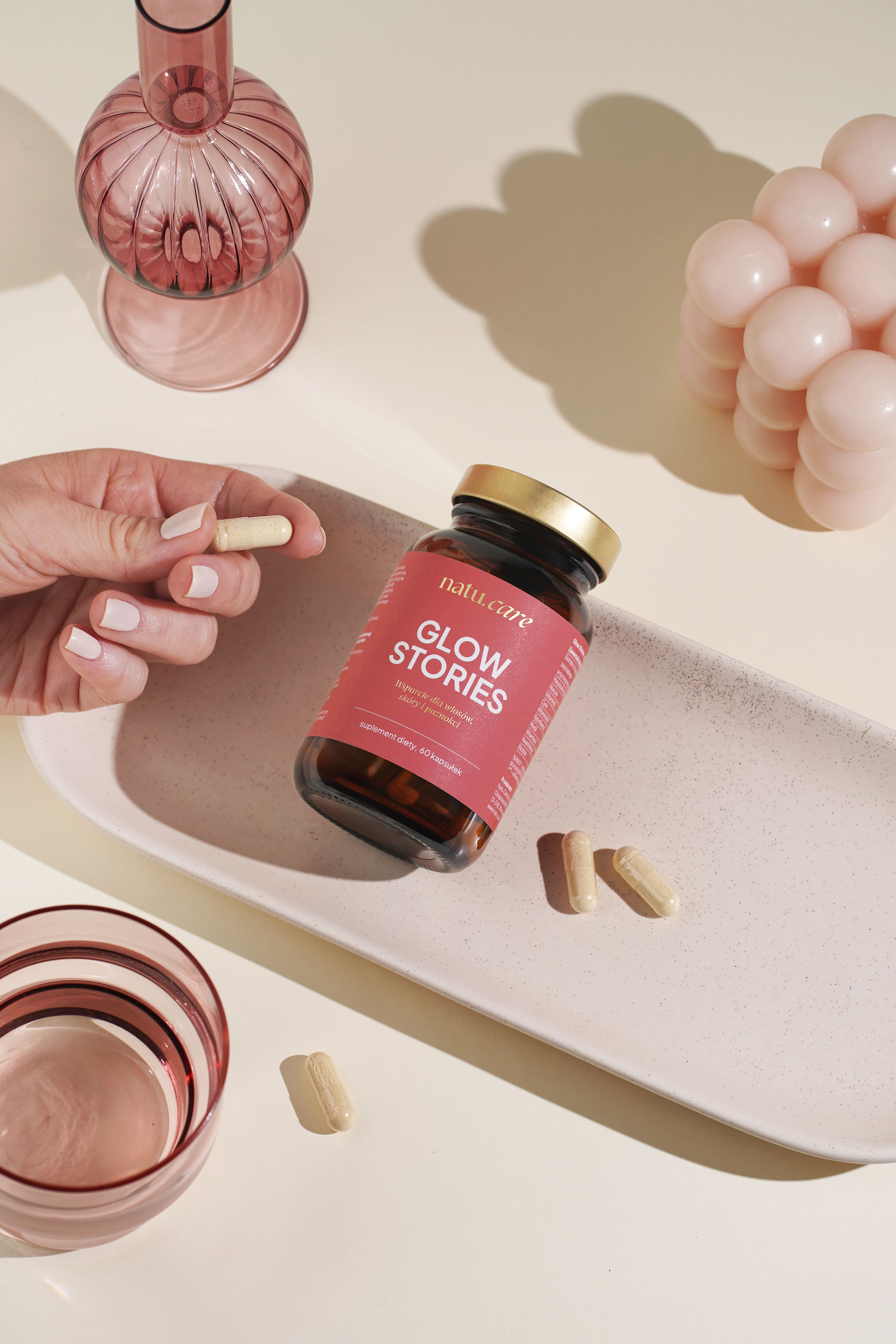Vitamin PP - what it is, what it's for, why it works, why it's on prescription and why it's so expensive
Vitamin PP also known as niacin or vitamin B3 supports the proper functioning of the body.


Learn more about our editorial process
.

Learn more about our editorial process
.

Learn more about our editorial process
.

Learn more about our editorial process
.
Why you can trust us
Articles on Natu.Care are written based on scientific research, data from government websites and other reliable sources. The texts are written in cooperation with doctors, nutritionists and other health and beauty experts. Articles are reviewed before publication and during significant updates.
.Learn more about our editorial process
.Information about advertisements
Content on Natu.Care may contain links to products from the sale of which we may receive a commission. When creating content, we adhere to high editorial standards and take care to be objective about the products discussed. The presence of affiliate links is not dictated by our partners, and we select the products we review ourselves completely independently.
.Learn more about our terms and Conditions
.Vitamin PP is one of the few vitamins that, until recently, was only given with a doctor's permission - by prescription. Although this has recently changed, what hasn't changed are its properties, which can be both salutary and... dangerous.
With Ilona Krzak, MSc, pharmacist, we will present the most important information about vitamin PP and answer the question of why most preparations that provide you with it are prescription-only.
From this article you will learn:
- What vitamin PP is and what it is still called. .
- What properties vitamin PP has and what it helps. .
- How much vitamin PP should be taken and what are the sources of vitamin PP. .
- What causes vitamin PP deficiency and excess. .
- Why vitamin PP is usually by prescription. .

Odkryj, co dla Twojej urody może zrobić Natu.Care Glow Stories
Skóra, włosy, paznokcie: Glow Stories
Wesprzyj prawidłowy stan skóry, włosów i paznokci i ochroń komórki przed stresem oksydacyjnym!
Sprawdź cenę
Glow Stories to formuła aktywnych składników, które zostały starannie dobrane wedle najnowszych badań naukowych. Znajdziesz w nich biotynę, cynk i miedź pielęgnujące zdrowie włosów i promiennej cery. Ponadto cynk jest odpowiedzialny także za zachowanie zdrowych paznokci. Mądra suplementacja zadba o Twoje piękno od środka.Julia Skrajda, dietetyk kliniczny
See also:
.
- Vitamin B1
- Vitamin B2
- Vitamin B3 (niacin)
- Vitamin B5 (pantothenic acid)
- Vitamin B6
- Vitamin B7 (biotin) .
- Vitamin B9 (folic acid) .
- Vitamin B12
- Vitamin C .
- Vitamin A
- Vitamin D3
- Vitamin E
- Vitamin K
What is vitamin PP?
.
Vitamin PP (B3) is one of the B vitamins. It is an essential nutrient for the proper functioning of the body. Vitamin PP plays a key role in many biological functions, including metabolic processes such as energy production and fatty acid synthesisand.
Vitamin PP also supports the health of the nervous and digestive systems, the skin, and is essential for cell regeneration. Its deficiency can lead to pelagra, a disease characterised by skin disorders, diarrhoea and dementia .
Vitamin PP is naturally found in many foods such as meat, fish, eggs, cereals, legumes and seeds .
What is vitamin PP otherwise called?
.
Vitamin PP is also called vitamin B3 or niacin. The latter term refers to two chemical compounds that are forms of niacin itself - nicotinic acid and nicotinamide. The name vitamin PP, on the other hand, refers to a disease that is caused by a niacin deficiency - pelagra (read about it below).
In the case of the term 'vitamin B3', there is no longer any interesting story - it is simply the third vitamin of the B group.
.
Vitamin PP - properties and effects
.
The interesting naming history is one thing, the properties are another. However, vitamin PP passes the test on both counts - its action is crucial to the proper functioning of the body.
What vitamin PP is for - role in the body:
.
Energy production
.
Vitamin PP is an integral component of many enzymes involved in the production of ATP - the primary 'fuel' for cells. ATP, or adenosine triphosphate, is the molecule that stores and provides the energy necessary for the function of all cells in the bodyand.
Niacin helps convert carbohydrates, fats and proteins into energy. It is involved in the biochemical reactions that enable these macronutrients to be used as a source of energy. Their processing is fundamental to the proper functioning of all systems in the bodyand.
Health of the nervous system
.
Vitamin PP is involved in the production of a number of key neurotransmitters, such as serotonin, which are essential for the proper functioning of the brain and nervous system. These neurotransmitters affect numerous aspects of mental health, including mood, sleep, appetite and overall wellbeingand.
Vitamin PP has received increasing interest as a potential treatment for Parkinson's disease. In animal studies, it has also been shown to have neuroprotective effects in other neurological pathologies, such as traumatic brain injury and multiple sclerosis.
 .
.
Ilona Krzak Master of Pharmacy
.
Niacin deficiencies can lead to the development of neurological insufficiency, which can manifest as depression, fatigue, apathy, cognitive decline and concentration problemsand.
Study
.A meta-analysis of studies on a total of 16,098 adults was conducted in 2023. The research paper assessed the effect of dietary vitamin PP content on the likelihood of depression. The study found that a moderate intake of niacin (amounting to approximately 36 mg per day) was associated with a lower risk of depressionand.
A clear association has been observed between vitamin PP deficiency in pregnant women and numerous congenital malformations in the fetus, such as vertebral or cardiovascular anomalies, tracheoesophageal fistulas and limb defects..
 .
.
Ilona Krzak Master of Pharmacy
.
skin health
.
Vitamin PP (niacinamide) is often used in cosmetics skin care products. As a key ingredient in a number of enzymes, it influences the metabolism of skin cells, helping to keep skin looking healthy and beautifuland.
The use of niacinamide strengthens the skin barrier, increases the production of collagen (which improves the elasticity of the skin), and prevents water loss, helping to maintain hydration levelsand.
.
Additionally, vitamin PP supports the treatment of various skin problems. It can reduce acne, redness and even symptoms associated with ageing, such as wrinkles. Studies also suggest that it may help protect the skin from the sun's harmful effects (UV rays)and.
Study
One clinical study tested the effect of topical application of niacinamide on signs of photo-ageing of the skin (wrinkles, discolouration, worse texture complexion). The research study involved 50 women who applied 5% niacinamide twice daily for 12 days. The study showed a range of effects, such as a reduction in fine lines and wrinkles, hyperpigmentation, red spots and yellowing of the skinand.
According to clinical studies, topical treatment with nicotinamide - alone or in combination with other active ingredients - reduces the progression of skin ageing and hyperpigmentation..
 .
.
Ilona Krzak Master of Pharmacy
Cell regeneration
.
Vitamin PP is involved in DNA formation and is important for cell division, which affects regenerative processes. Maintaining healthy DNA is important for cell repair and preventing damage that could lead to health problemsand.
Niacin also helps in the production of red blood cells, which are essential for delivering oxygen to all cells in the body. Adequate concentrations of vitamin PP in the body make cells better nourished, allowing for more effective regenerationand.
Proper levels of vitamin PP in the body are associated with a reduced risk of squamous cell carcinoma. Furthermore, this compound may also protect against breast cancer recurrence and metastasis..
 .
.
Ilona Krzak Master of Pharmacy
.
Heart support
.
Vitamin PP effectively regulates cholesterol levels, making it an important role in the prevention of heart disease. It can lower 'bad' LDL cholesterol, increases 'good' HDL cholesterol and reduces triglycerides in the bloodand.
This action promotes the protection of blood vessels from blockages and cholesterol plaque formation, which reduces the risk of cardiovascular diseases such as atherosclerosis.
.
Vitamin PP also helps to regulate blood pressure - this translates into a reduced risk of hypertension, which is one of the main factors that can lead to heart diseaseand.
Study
The study, conducted on 468 participants (including 125 with diabetes), tested the effect of niacin on LDL 'bad' cholesterol and HDL 'good' cholesterol, as well as triglycerides. The research paper showed a 29% increase in HDL, and reductions in triglycerides and LDL of 23-28% and 8-9% respectivelyand.
Supplementation with vitamin PP may reverse coronary atherosclerosis and prevent the risk of cardiac death..
 .
.
Ilona Krzak Master of Pharmacy
.
Daily requirement of vitamin PP
.
The daily requirement for vitamin PP is age-dependent. It also changes during pregnancy and breastfeeding, when it is particularly important to ensure the correct concentration of the nutrient in the body. What are the norms for the Polish population?
|
Age |
Daily vitamin PP requirementsand |
|
0-6 months |
2 mg |
|
7-11 months |
5 mg |
|
1-3 years |
6 mg |
|
4-6 years |
8 mg |
|
7-12 years |
12 mg |
|
> 13 years old males |
16 mg |
|
> 13 years old female |
14 mg |
The requirement for vitamin PP during pregnancy increases to 18 mg per day, and is 1 mg lower for the breastfeeding period at 17 mg per day.
The upper intake level for vitamin PP is 35 mg/day. Above this intake, side effects such as hot flashes already occur..
 .
.
Ilona Krzak Master of Pharmacy
.
Where vitamin PP is found - sources in the diet
.
Vitamin PP can easily be found in many different food sources. It is found in both plant and animal products. What are good dietary sources of vitamin PPand?
- Meat. Meat - poultry, veal, beef, pork - is an excellent source of niacin.
- Meat.
- Fish. Many types of fish, especially oily marine fish such as salmon, tuna and anchovies, are rich sources of niacin.
- .
- Cereals. Many cereal foods such as whole-grain breads, pasta and fortified breakfast cereals contain niacin.
.
- legumes. Various beans, peas or lentils are natural sources of vitamin PP, making them an attractive choice for those on a plant-based diet.
- Seeds. Seeds, such as sunflower or pumpkin seeds, are rich in niacin and can be a tasty addition to many dishes.
The bioavailability of vitamin PP from grains is about 30%. However, it increases significantly after alkaline treatment..
 .
.
Ilona Krzak Master of Pharmacy
.
What is vitamin PP in - table
. .
17 mg
|
Product . |
Vitamin PP content per 100 gand |
|
Rice bran . |
34 mg |
|
Cooked tuna |
22 mg |
|
Sardelles |
20 mg |
|
Fried beef liver |
17.5 mg |
|
Cooked lamb liver . |
|
|
Cooked lamb liver |
|
|
Dried shiitake mushrooms |
14.1 mg |
|
Anchovies raw |
14 mg |
|
Breaded chicken breast |
13.7 mg |
|
Milled turkey |
12.6 mg |
Vitamin PP deficiency
.
Vitamin PP deficiency is rare, but can lead to serious health problems. Possible causes of this condition include an unhealthy diet, gastrointestinal disease and excessive alcohol consumption.
- Inappropriate diet. Diet poor in vitamin PP, such as too little whole grain products, meat or fish in the diet, can lead to vitamin PP deficiency. This is particularly common in developing countries, where the main foods are often maize or milletand.
- Gastrointestinal disorders. Gastrointestinal conditions such as Crohn's disease and coeliac disease can impede the absorption of vitamins, including vitamin PP, which can result in vitamin deficiencyand. .
- Overconsumption of alcohol. Abuse of alcoholic beverages can lead to inhibition of absorption and increased excretion of vitamin PP from the body, putting you at risk of vitamin PP deficiency . .
What are the symptoms of vitamin PP deficiency?
.
Vitamin PP deficiency can lead to serious health symptoms. These symptoms are often varied, but most commonly include skin and mental problems and disorders from the gastrointestinal tract.
Dermal problems
.
One of the characteristic symptoms of vitamin PP deficiency is skin lesions. Insufficient niacin in the body can make the skin rough, dry, and flaky - especially in sun-exposed areas of the body. Widespread rashes are also possible, which do not subside despite typical medicationand.
Gastrointestinal disorders
.
Niacin plays a key role in metabolism, so a deficiency of this vitamin can result in various gastrointestinal problems. These symptoms can include loss of appetite, nausea, diarrhoea or abdominal painand.
Psychiatric problems
.
Inadequate amounts of vitamin PP in the body can lead to various mental disorders. In extreme cases, niacin deficiency can even cause dementia and schizophrenia-like symptoms. More common, however, are depressive states, apathy and fatigueand.
Vitamin PP deficiency disease - pelagra
.
A disease that is directly related to vitamin PP deficiency is pelagra. This condition used to be quite common, especially in areas where the diet was almost exclusively maize-based food. Nowadays, pelagra is relatively rare, especially in developed countries, but it still occurs in some regions of the worldand.
Pelagra manifests itself with the so-called 'triple "D" syndrome - dermatitis, diarrhoea, dementia, which in Polish means dermatitis, diarrhoea and dementia, respectively. Patients with pelagra have characteristic skin lesions, digestive disorders and, in an advanced state of the disease, severe neurological problems can occurand.
The treatment of pelagra is most often based on taking high doses of niacin, as well as correcting deficiencies in other nutrients. Adequate and prompt medical care can ensure that the patient is completely cured of pelagra and that all symptoms disappear.
Vitamin PP excess
.
Vitamin PP excess usually results from too much intake of dietary supplements or medications containing this vitamin. Niacin is a water-soluble vitamin, which means that the body is able to excrete excess amounts in the urine. However, with significantly increased intake, exceeding the recommended daily intake, poisoning can occurand.
Vitamin PP excess is often seen among people who unwisely use high doses of niacin to treat certain health conditions, such as high cholesterol.
It is worth noting that natural sources of niacin will not usually lead to an excess, as the vitamin PP content of the foods consumed is at safe levels.
What are the symptoms of vitamin PP excess?
.
Excess vitamin PP can lead to a number of unpleasant symptoms. Effects of an overdose include, but are not limited to, redness of the skin, headaches and dizziness, and digestive problems.
.
Redness.
There is no need to take a vitamin PP supplement.
|
Symptom . |
What are the characteristics of and |
||
|
Reddening of the skin . |
Excess vitamin PP can cause redness and a warm sensation on the skin. This symptom is usually transient and usually occurs shortly after ingestion of high doses of niacin. |
||
|
Headache |
Vitamin PP overdose can lead to headaches, which will usually vary in intensity depending on the amount of vitamin consumed. |
||
|
Dizziness |
High doses of niacin can cause dizziness, reducing the ability to perform certain activities, such as driving or operating machinery. |
High doses of niacin can cause dizziness, reducing the ability to perform certain activities, such as driving or operating machinery. |
|
|
Digestion problems |
|||
| . |
In some cases, an excess of vitamin PP can lead to digestive problems such as nausea, vomiting or diarrhoea. When these symptoms are severe or persist over a long period of time, you should contact your doctor. |
||
|
Dermal lesions |
When too much vitamin PP is taken, a rash or itching may appear on the skin. |
The skin may be affected. |
|
|
Uncommon fatigue . |
Inappropriately high levels of niacin in the body can lead to feelings of general fatigue and weakness that are not typical, but rather excessive and unusually strong. |
Vitamin PP - supplementation
.
Supplementation of vitamin PP reserved is for a very limited group of people. Most of us provide adequate amounts of this vitamin with our diet. Moreover, unwise supplementation of niacin can even be hazardous to health.
Why is vitamin PP on prescription?
.
Vitamin PP is on prescription because some studies suggest that when used inappropriately it can lead to damage to the liver, hypotension, and result in stomach ulcers. Furthermore, niacin can also exacerbate allergies, gallbladder disease and thyroid problemsand.
Although there are several over-the-counter vitamin PP supplements available on the market. However, these remedies should only be taken under the guidance of a doctor, following a prior medical history.
Contraindications to the use of vitamin PP
.
Vitamin B3 is essential for the functioning of the body, but not everyone can take it in supplement form. There are specific contraindications to niacin supplementation that need to be considered before starting to take it. Which ones?
- Diseases liver. People with liver disease should avoid niacin supplementation without first consulting their doctor. Vitamin PP is metabolised by the liver, so in high doses it can lead to damage to this organand. .
- Gastrointestinal disorders. Vitamin PP can exacerbate the symptoms of conditions such as stomach and intestinal ulcers, so people with these problems should be cautious with niacin supplementationand. .
- Diseases thyroid. Vitamin PP may affect thyroid hormone levels, which involves adjusting the dose of medication in people who have problems with this organ .
- Goutain. Niacin can increase uric acid levels in the body, which can lead to health problems in people with goutand. .
- Diabetes. Although niacin can be beneficial in treating high cholesterol, it can also increase blood sugar levels, putting diabetes patients at riskand. .
Interactions of vitamin PP with drugs
.
Vitamin PP in the form of a medicine or dietary supplement can react with certain preparations. Which agents are being referred to?"
Vitamin PP may interact withand:
- anticoagulants, .
- high blood pressure medicines,
- drugs for diabetes, .
- drugs for diabetes, .
- zinc, .
- statins, .
- chromium, .
- allopurinol, .
Vitamin PP - side effects
.
Like most dietary supplements, vitamin PP, too, can cause some side effects. The most typical is a feeling of warmth and redness of the skin, which usually occurs within the first few weeks of taking niacinand.
Other side effects may include nausea, vomiting, abdominal pain and, in some cases, headaches and dizziness. High doses of vitamin PP can also 'surprise' the digestive system, causing problems such as heartburn, diarrhoea, or gasand.
Often the side effects are only temporary, but if they persist longer or gain strength, it is advisable to consult a doctor.
See also:
- Vitamin D3 - which is the best? .
- Vitamin D3 drops
- Vitamin D overdose
- Maximum dose of vitamin D .
- Vitamin D deficiency .
- Vitamin D - dosage .
- How to quickly correct vitamin B12 deficiency
- Vitamin B12 deficiency
- What vitamin D is
- Vitamin D3K2
- ADEK vitamins .
- Pregnancy vitamins
- Vitamins for men
- Best multivitamin
- Vitamin A+E
- Biotin for hair
- Coenzyme Q10
Summary
.
- Vitamin PP, a.k.a. niacin or vitamin B3, is crucial for the body to function properly.
- Helps the health of the nervous system, skin, digestive system and plays an important role in cell regeneration.
- Niacinamide is the active form of vitamin PP, which is used in skin cosmetics.
- Vitamin PP is naturally found in a variety of foods, mainly meat, fish, cereals, legumes and seeds.
- The daily requirement of vitamin PP is age-dependent and increases during pregnancy and during breastfeeding.
- The daily requirement of vitamin PP is also age-dependent and increases during pregnancy and during breastfeeding.
- Vitamin PP deficiency is rare, but when it occurs, it can lead to serious health problems such as pelagra.
- Excess vitamin PP, usually results from the ingestion of excessive doses of dietary supplements or medications and can lead to redness of the skin, pain and dizziness, as well as digestive problems.
- Supplementation of vitamin PP is mainly indicated for people with specific health problems and usually requires a prescription, as inappropriate dosage can lead to liver damage, hypotension and stomach ulcers.
FAQ
.Is vitamin PP on prescription?
.Yes, most vitamin PP preparations (e.g. Vitaminum PP 200) are on prescription. Nevertheless, dietary supplements with niacin are also available. The price of vitamin PP depends on the manufacturer, but is usually a few tens of zlotys.
Vitamin PP - where to buy it
.Vitamin PP can be purchased at a pharmacy. Some online shops also offer it, but it is much less common there.
Can vitamin PP help treat acne?
.Yes, vitamin PP is often used in skin care products for its beneficial properties, including its ability to reduce symptoms acne. Niacin helps improve skin barrier function, reduces sebum secretion, increases production collagen and prevents water loss, which supports the maintenance of skin hydration.
Can vitamin PP be taken with other vitamins?
.Yes, vitamin PP can be safely taken along with other vitamins and nutrients. Vitamin PP is part of many B vitamin complexes that are widely available on the market. However, remember to always consult your doctor before starting any supplementation.
Is vitamin PP safe for children?
.Vitamin PP is safe for children if they take it with their diet. It is an essential nutrient for normal growth and development, as it plays a key role in many metabolic processes that are important for a child's health.
However, its use in the form of a dietary supplement should always be consulted with a doctor.
Can I get vitamin PP from plant foods?
.Yes, vitamin PP is present in many plant-based foods, such as legumes and seeds. However, it is worth noting that its amount in plant foods is generally lower than in animal products.
This is why people on a vegetarian or vegan diet need to be particularly careful when choosing their daily menu to meet their requirements for this vitamin.
What is the daily requirement for vitamin PP?
.The daily requirement for vitamin PP depends on your age, gender and health status. For adult men it is 16 mg per day, while for adult women it is 14 mg per day.
The requirement increases during pregnancy to 18 mg per day, and during breastfeeding it is 17 mg per day.
Can I take vitamin PP during pregnancy?
.Yes, vitamin PP is safe to take during pregnancy along with your diet. Its correct intake should even be taken more carefully during this period of life due to the body's greater need for this vitamin.
Always consult your doctor about starting vitamin PP supplementation during pregnancy.
Can vitamin PP supplements cause side effects?
.Yes, vitamin PP supplementation can lead to side effects, especially when taken in high doses. Side effects may include reddening of the skin, headaches or dizziness, or gastrointestinal problems.
.
Sources
.See all
.Annual Review of Cosmetic Ingredient Safety Assessments-2002/20031. (2005). International Journal of Toxicology, 24(1_suppl), 1-102. https://doi.org/10.1080/10915810590918625
Bhatt, T., Khedkar, S. U., Dam, B., Lall, S., Pandey, S., Kataria, S., Dias, P. M., Waskar, M., Raut, J., Sundararamurthy, V., Vemula, P. K., Ghatlia, N., Majumdar, A., & Jamora, C. (2022). Niacinamide enhances cathelicidin mediated SARS-CoV-2 membrane disruption (p. 2022.08.26.505399). bioRxiv. https://doi.org/10.1101/2022.08.26.505399
Chen, A. C., Martin, A. J., Choy, B., Fernández-Peñas, P., Dalziell, R. A., McKenzie, C. A., Scolyer, R. A., Dhillon, H. M., Vardy, J. L., Kricker, A., St. George, G., Chinniah, N., Halliday, G. M., & Damian, D. L. (2015). A Phase 3 Randomized Trial of Nicotinamide for Skin-Cancer Chemoprevention. New England Journal of Medicine, 373(17), 1618-1626. https://doi.org/10.1056/NEJMoa1506197
Duggal, J. K., Singh, M., Attri, N., Singh, P. P., Ahmed, N., Pahwa, S., Molnar, J., Singh, S., Khosla, S., & Arora, R. (2010). Effect of Niacin Therapy on Cardiovascular Outcomes in Patients With Coronary Artery Disease. Journal of Cardiovascular Pharmacology and Therapeutics, 15(2), 158-166. https://doi.org/10.1177/1074248410361337
Elam, M. B., Hunninghake, D. B., Davis, K. B., Garg, R., Johnson, C., Egan, D., Kostis, J. B., Sheps, D. S., & Brinton, E. A. (2000). Effect of niacin on lipid and lipoprotein levels and glycemic control in patients with diabetes and peripheral arterial disease: the ADMIT study: A randomized trial. Arterial Disease Multiple Intervention Trial. JAMA, 284(10), 1263-1270. https://doi.org/10.1001/jama.284.10.1263
Final Report of the Safety Assessment of Niacinamide and Niacin1. (2005). International Journal of Toxicology, 24(5_suppl), 1-31. https://doi.org/10.1080/10915810500434183
Haahr, H., & Heise, T. (2020). Fast-Acting Insulin Aspart: A Review of its Pharmacokinetic and Pharmacodynamic Properties and the Clinical Consequences. Clinical Pharmacokinetics, 59(2), 155-172. https://doi.org/10.1007/s40262-019-00834-5
Jonas, W. B., Rapoza, C. P., & Blair, W. F. (1996). The effect of niacinamide on osteoarthritis: A pilot study. Inflammation Research, 45(7), 330-334. https://doi.org/10.1007/BF02252945
Niacin. (2012). In LiverTox: Clinical and Research Information on Drug-Induced Liver Injury. National Institute of Diabetes and Digestive and Kidney Diseases. http://www.ncbi.nlm.nih.gov/books/NBK548176/
Niacin intake and risk of skin cancer in US women and men-Park-2017-International Journal of Cancer-Wiley Online Library. (n.d.). Retrieved 21 June 2023, from https://onlinelibrary.wiley.com/doi/10.1002/ijc.30630
Office of Dietary Supplements-Niacin. (n.d.). Retrieved 17 March 2023, from https://ods.od.nih.gov/factsheets/Niacin-HealthProfessional/
Palawaththa, S., Islam, R. M., Illic, D., Rabel, K., Lee, M., Romero, L., Leung, X. Y., & Karim, Md. N. (2022). Effect of maternal dietary niacin intake on congenital anomalies: A systematic review and meta-analysis. European Journal of Nutrition, 61(3), 1133-1142. https://doi.org/10.1007/s00394-021-02731-9
Park, S. M., Li, T., Wu, S., Li, W.-Q., Weinstock, M., Qureshi, A. A., & Cho, E. (2017). Niacin intake and risk of skin cancer in US women and men. International Journal of Cancer, 140(9), 2023-2031. https://doi.org/10.1002/ijc.30630
Peechakara, B. V., & Gupta, M. (2023). Vitamin B3. In StatPearls. StatPearls Publishing. http://www.ncbi.nlm.nih.gov/books/NBK526107/
.Redzic, S., Hashmi, M. F., & Gupta, V. (2022). Niacin Deficiency. In StatPearls. StatPearls Publishing. http://www.ncbi.nlm.nih.gov/books/NBK557728/
Ren, X., Yang, Z., Shao, B., Yin, S., & Yang, X. (2015). B-Vitamin Levels in Human Milk among Different Lactation Stages and Areas in China. PLOS ONE, 10(7), e0133285. https://doi.org/10.1371/journal.pone.0133285
Sauve, A. A. (2008). NAD+ and vitamin B3: From metabolism to therapies. The Journal of Pharmacology and Experimental Therapeutics, 324(3), 883-893. https://doi.org/10.1124/jpet.107.120758
Snaidr, V. A., Damian, D. L., & Halliday, G. M. (2019). Nicotinamide for photoprotection and skin cancer chemoprevention: A review of efficacy and safety. Experimental Dermatology, 28(S1), 15-22. https://doi.org/10.1111/exd.13819
Zhang, Z., Liu, M., Zhou, C., He, P., Zhang, Y., Li, H., Li, Q., Liu, C., & Qin, X. (2021). Evaluation of Dietary Niacin and New-Onset Hypertension Among Chinese Adults. JAMA Network Open, 4(1), e2031669. https://doi.org/10.1001/jamanetworkopen.2020.31669
.
Editorials
Meet the team

Ilona Krzak obtained her Master of Pharmacy degree from the Medical University of Wrocław. She did her internship in a hospital pharmacy and in the pharmaceutical industry. She is currently working in the profession and also runs an educational profile on Instagram: @pani_z_apteki

![Vitamin B12 - where it occurs in the diet and in products [table].](https://cdn-resources.natu.care/uploads/1/balanced_diet_nutrition_healthy_eating_concept_food_sources_rich_vitamin_b12_cobalamin_kitchen_table_1_b84f75bda2.jpg)
Find out where vitamin B12 is found and which products will provide you with it.
![What is NMN? Effects, effects, side effects [supplements].](https://cdn-resources.natu.care/uploads/1/science_background_with_molecule_atom_abstract_structure_science_medical_background_3d_illustration_1_a5ec4d9cec.jpg)
Everything you want to know about NMN: properties, effects, safety and expert opinions.

See what using vitamin C on your face gives you and what to keep in mind when including it in your skincare routine.
